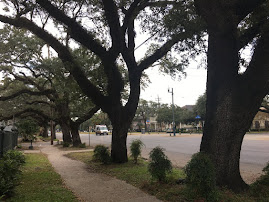Maia, the Greek goddess of Spring, with her six sisters
Dear George,
It’s just four more days until the start of May, and already my mood is getting cheerier. We’ve had an o.k. April, but sporadic snowstorms and too much rain have put a damper on it. I was amazed by the photos from my hometown in the U.P. — snowdrifts ten feet tall in mid-April. May, though, is definitely the best. Flowers in full boom, birds are singing from all directions, and good weather for taking a stroll after supper. Our Cincinnati summers get hot and humid in June and July, but May is ideal. I was pleased to discover on the Internet that Americans in general share my opinion. In December 1960 the Gallup Survey asked people to name their favorite month of the year. May came in first, followed by June and July. Gallup repeated the question in June 2005, and May again was the most popular. Here are some facts about May that will put one in an even better mood.
Love,
Dave
MAY SYMBOLS (2, 16) [Note: Numbers refer to sources at end]
Name: May was named after the Greek Goddess of Fertility, Maia, who oversaw the growth of plants and vegetation.
May Birthstone: Emerald (symbolizing rebirth and fertility)
May Flower: Lily of the Valley (symbolizing the return of happiness)
Zodiac signs: Taurus (Apr. 21 - May 20); Gemini (May 21 - June 2)
CURIOUS MAY FACTS (1, 9, 16)
In any given year not one other month begins or ends on the same day of the week as does May.
May is the only month of the year in which no U.S. president has ever died.
May was called Tri-Milchi in Old English because it was the month in which dairy cows could be milked three times a day.
According to Google, “may” is the 55th most frequently used word in the English language.
“MAY” IN OTHER LANGUAGES (8, 15, 16)
Maius (Latin), Mei (French), Maggio (Italian), Mai (German and Danish), Maj (Polish, Russian, Swedish, and Norwegian), Mei (Dutch), Mayo (Spanish), Traven (Ukrainian), Toukokuu (Finnish), Wuyue (Chinese/Mandarin)
MAY SUPERSTITIONS (2, 7, 24)
It is unlucky to buy a new broom or to wash a blanket in May.
May is a bad luck month to get married (“Marry in May and you’ll rue the day.”)
If you get up early and wash your face in the May dew, it will remove all your freckles and pimples.
Cats born in May won’t catch mice but they will bring home snakes.
“A dry May and a leaking June / Make the farmer whistle a merry tune.”
MONTHLONG CELEBRATIONS IN MAY (16)
Date Your Mate Month
Zombie Awareness Month
Fungal Infection Awareness Month
Chocolate Custard Month
Better Hearing and Speech Month
Better Sleep Month
Loaded Potato Month
National Smile Month
MAY 2018 HOLIDAYS (6, 7, 13)
May 1: May Day
May 5: Cinco de Mayo
May 7: World Naked Gardening Day
May 7: Kentucky Derby
May 8: End of the Second World War
May 8: Teacher’s Day
May 11: National Eat What You Want Day
May 13: Mother’s Day
May 14: National Dance Like a Chicken Day
May 16: Ramadan begins
May 19: Armed Forces Day
May 28: Memorial Day
May 28: Victoria Day (Canada)
COUNTRY SINGERS BORN IN MAY (12)
May 1, 1967: Tim McGraw, county western singer
May 3, 1964: Wynona Judd, country singer
May 4, 1959: Randy Travis, country singer
May 5, 1942: Tammy Wynette, country singer
May 9, 1914: Hank Snow, country singer
May 18, 1952: George Strait, country singer
May 26, 1949: Hank Williams Jr., country singer
May 30, 1964: Wynona Judd, country singer
A FEW OF THE FAMOUS PEOPLE NAMED MAY (18, 19)
Louisa May Alcott (1832-1888). American novelist, poet; author of Little Women.
May Miller (1899-1995). African-American poet, playwright, educator, leader in the Harlem Renaissance
Rollo May (1909-1994). American existential psychologist, author.
May Sarton (1912-1995). American poet, novelist, and memoirist.
Elaine May (1932- ). American screenwriter, oil director, actress, comedian.
May Britt (1934- ). Swedish film actress; married Sammy Davis Jr.
Lee May 1943- ). Former Cincinnati Reds first baseman.
Theresa May (1956- ). British Conservative politican, current UK Home Secretary.
May Andersen (1982- ). Danish former model (Victoria’s Secret, SI Swimsuit Issue).
SELECTED HISTORICAL EVENTS IN MAY (16)
May 10, 1869: Union Pacific and Central Pacific railroads completed the Transcontinental Railroad.
May 20, 1927: Charles Lindbergh took off on the first solo, nonstop flight across the Atlantic.
May 23, 1934: Bonnie and Clyde were shot to death near Bienville Parish, Louisiana.
May 24, 1935: The Reds beat the Phillies 2-1 in major league baseball’s first night game at Crosley Field.
May 6, 1937: The Hindenburg exploded over Lakehurst, NJ, killing 36 passengers and crew.
May 6, 1954: Roger Bannister broke the four-minute mile at Oxford, England.
May 17, 1954: The Supreme Court, in Brown vs. Board of Education of Topeka, ruled that racial segregation in public schools was unconstitutional.
May 16, 1983: Michael Jackson performed his “Moonwalk” dance for the first time on TV.
May 22, 1992: Johnny Carson’s last show on The Tonight Show.
May 1, 2011: Osama bin Laden reported killed by U.S. forces in Pakistan.
SONGS ABOUT MAY (22, 25)
Autumn to May (Peter, Paul, & Mary)
End of May (Michael Buble)
First of May (The Bee Gees)
The Lusty Month of May (Lerner & Loewe, Camelot)
People Who Are Born in May (Julie London)
Stormy May Day (AC/DC)
MAY QUOTES (4, 5, 7, 10, 11, 17, 23, 26)
For May wol have no slogardie a-night. The season priketh every gentil herte, And maketh him out of his slepe to sterte. (Geoffrey Chaucer, “The Knight’s Tale”)
Rough winds do shake the darling buds of May. (William Shakespeare)
May, queen of blossoms, and fulfilling flowers; With what pretty music Shall we charm the hours? (Lord Edward Thurlow)
Sweet May hath come to love us, Flowers, trees, their blossoms don. (Heinrich Heine)
I thought that spring must last forevermore; For I was young and loved, and it was May. (Vera Brittain)
April is a promise that May is bound to keep. (Hal Borland)
May: the lilacs are in bloom. Forget yourself. (Marty Rubin)
SOURCES:
(1) 929thelake.com, “7 Interesting Facts You May Not Know About May”; (2) almanac.com, “The Month of May 2018”; (3) blogs.wfmt.com, “6 Songs to Welcome the Merry Month of May”;(4) brainyquote.com, “Month of May”;(5) bustle.com, “16 May Day Quotes That Celebrate Spring”; (6) calendar-365.com, “2018 Holidays”; (7) celebrationjoy.com, “Month of May: Fun Facts, Quotes, and Trivia”; (8) ducksters.com, “May in History”; (9) express.co.uk, “Top ten facts about May”; (10) gardendigest.com, “May”; (11) goodreads.com, “May Quotes”; (12) holidayinsights.com, “Famous May Birthdays”; (13) holidayscalendar.com, “May Holidays in 2018/2019”; (14) mentalfloss.com, “11 Famous Birthdays to Celebrate in May”; (15) omniglotcom, “Months of the year in many different languages”; (16) popculturemadness.com, “May Trivia”; (17) quotestree.com, “Month of May Quotes and Sayings”; (17b) ranker.com, “The Best Movies With May in the Title”; (18) ranker.com, “Famous People Named May”; (19) ranker.com, “Famous People Whose Last Name is May”; (20) rhymezone.com, “Words and phrases that rhyme with may”; (21) The Washington Post, “The definitive ranking of the best and worst months of the year”; (22) thecavanproject.com, “13 Songs About May”; (23) thefreshquotes.com, “21 May Day Quotes”; (24) the studyabroadportal.com, “6 interesting facts about the month of May”; (25)
ussers.globalnet.co.uk, “Song Titles with Months in Them”); (26) wiseoldsayings.com, “May Sayings and Quotes”




































































































































































